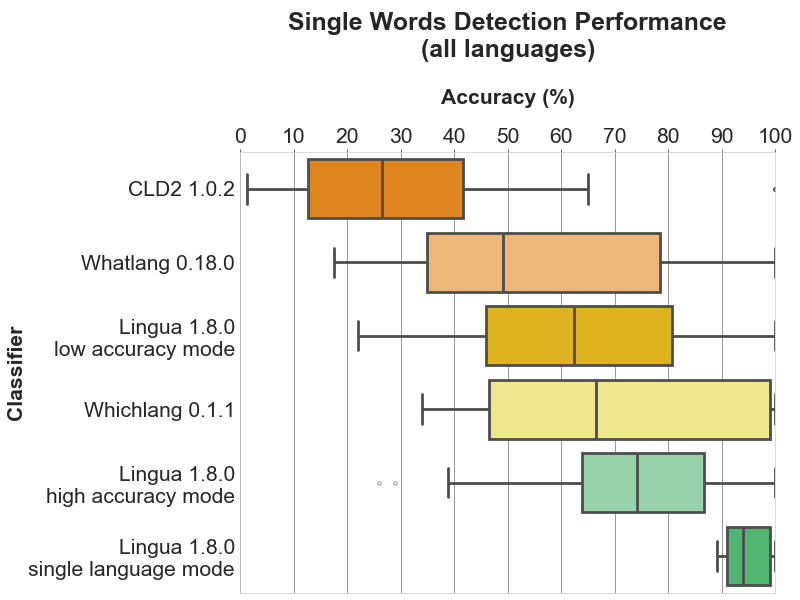
Its task is simple: It tells you which language some text is written in. This is very useful as a preprocessing step for linguistic data in natural language processing applications such as text classification and spell checking. Other use cases, for instance, might include routing e-mails to the right geographically located customer service department, based on the e-mails' languages.
Language detection is often done as part of large machine learning frameworks or natural language processing applications. In cases where you don't need the full-fledged functionality of those systems or don't want to learn the ropes of those, a small flexible library comes in handy.
So far, other comprehensive open source libraries in the Rust ecosystem for this task are CLD2, Whatlang and Whichlang. Unfortunately, most of them have two major drawbacks:
Lingua aims at eliminating these problems. She nearly does not need any configuration and yields pretty accurate results on both long and short text, even on single words and phrases. She draws on both rule-based and statistical methods but does not use any dictionaries of words. She does not need a connection to any external API or service either. Once the library has been downloaded, it can be used completely offline.
Compared to other language detection libraries, Lingua's focus is on quality over quantity, that is, getting detection right for a small set of languages first before adding new ones. Currently, the following 75 languages are supported:
Lingua is able to report accuracy statistics for some bundled test data available for each supported language. The test data for each language is split into three parts:
Both the language models and the test data have been created from separate documents of the Wortschatz corpora offered by Leipzig University, Germany. Data crawled from various news websites have been used for training, each corpus comprising one million sentences. For testing, corpora made of arbitrarily chosen websites have been used, each comprising ten thousand sentences. From each test corpus, a random unsorted subset of 1000 single words, 1000 word pairs and 1000 sentences has been extracted, respectively.
Given the generated test data, I have compared the detection results of Lingua, CLD2, Whatlang and Whichlang running over the data of Lingua's supported 75 languages. Languages that are not supported by the other libraries are simply ignored for the respective library during the detection process.
Each of the following sections contains four plots. The bar plots show the detailed accuracy results for each supported language. The box plots illustrate the distributions of the accuracy values for each classifier. The boxes themselves represent the areas which the middle 50 % of data lie within. Within the colored boxes, the horizontal lines mark the median of the distributions.
The first two plots in each section show the results for all supported languages in each classifier, respectively. The last two plots are restricted to the common subset of currently 16 languages that is supported by all compared classifiers. This distinction makes sense because the first box plot creates the impression that Whichlang is the most accurate classifier, but it is not. Whichlang supports only 16 languages whereas Lingua supports 75 languages. For the second box plot, the supported languages in Whatlang and Lingua have been restricted to those 16 languages supported by Whichlang. This provides for a more accurate comparison and shows that overall, Lingua is the most accurate language detection library in this comparison.

Bar plot

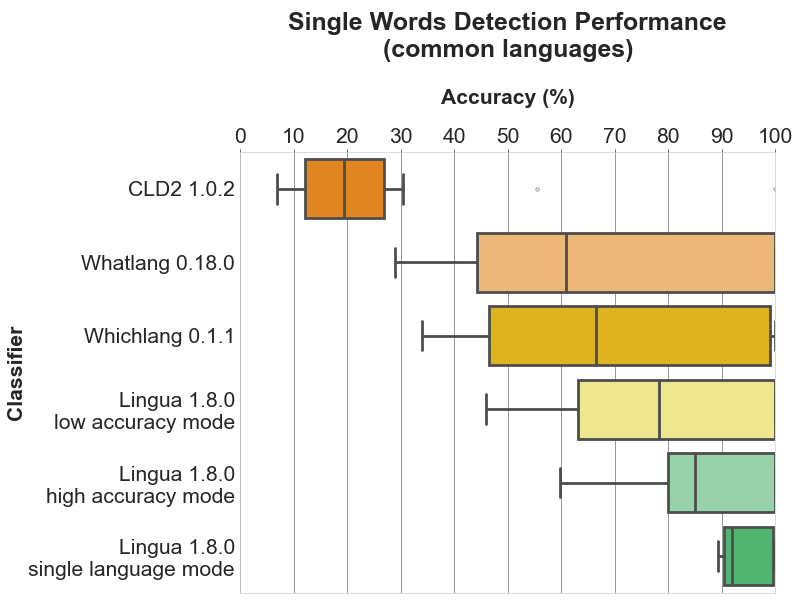
Bar plot
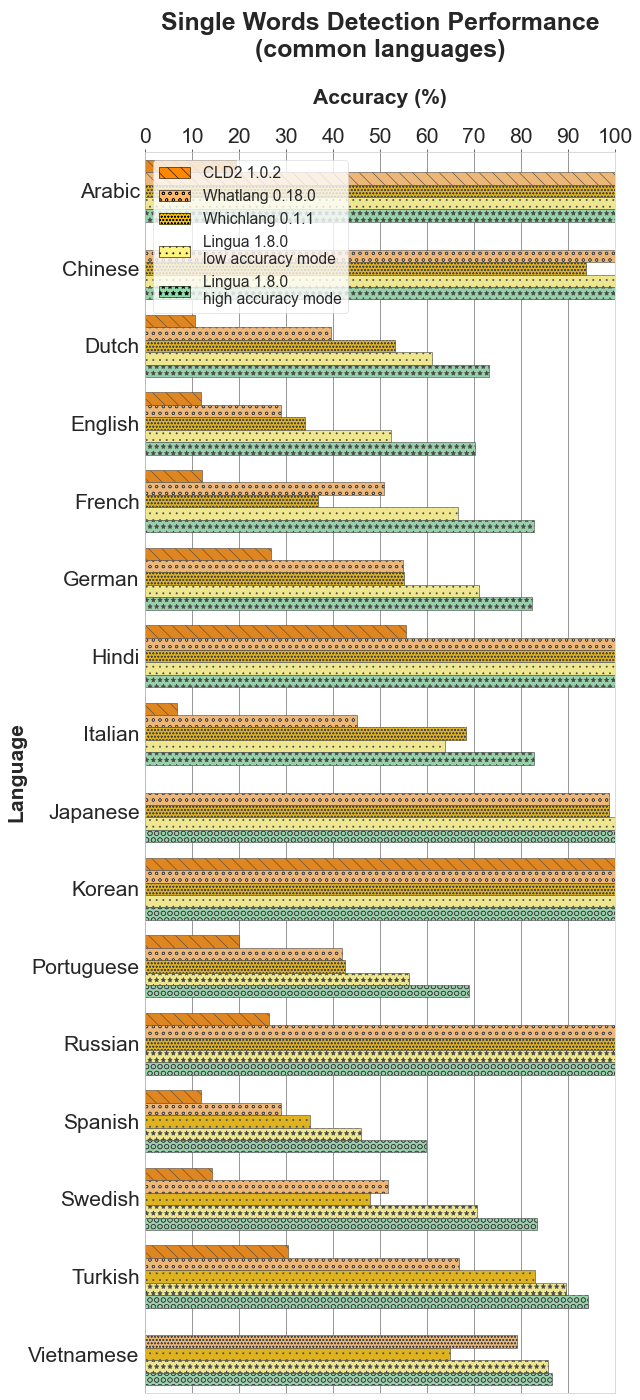
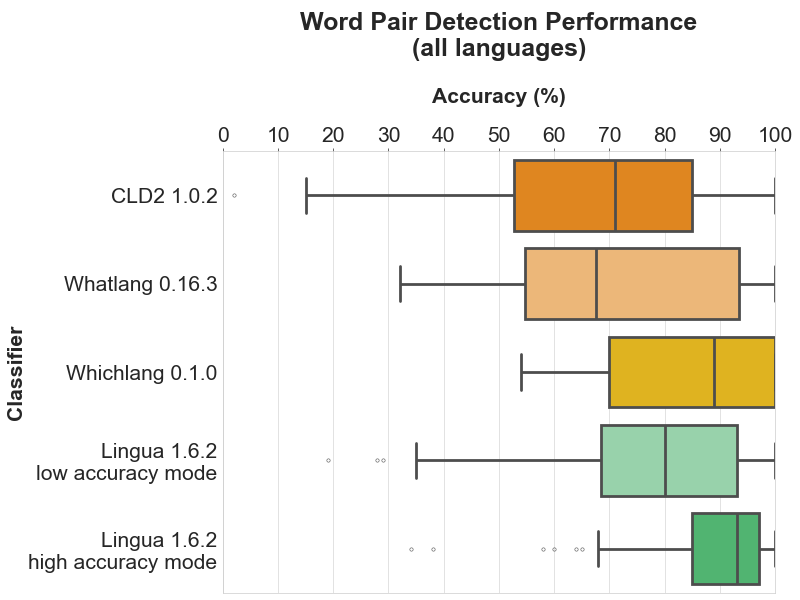
Bar plot

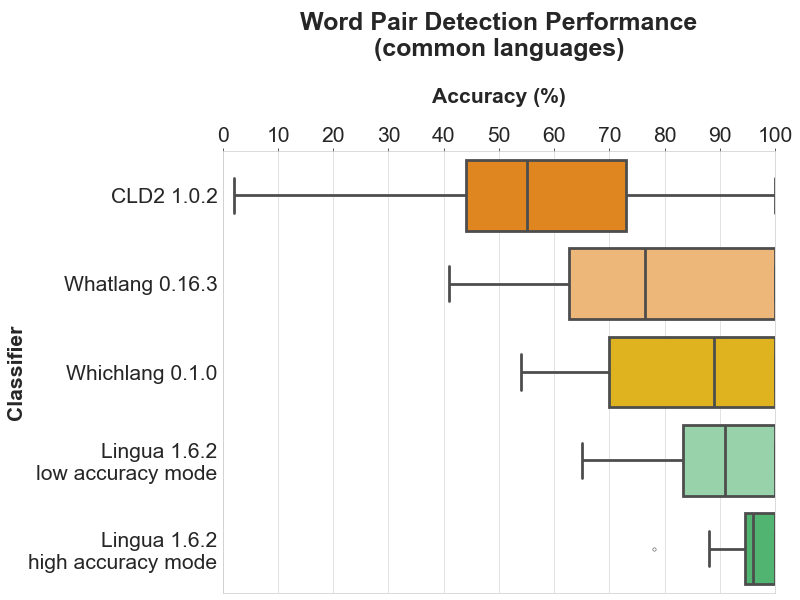
Bar plot
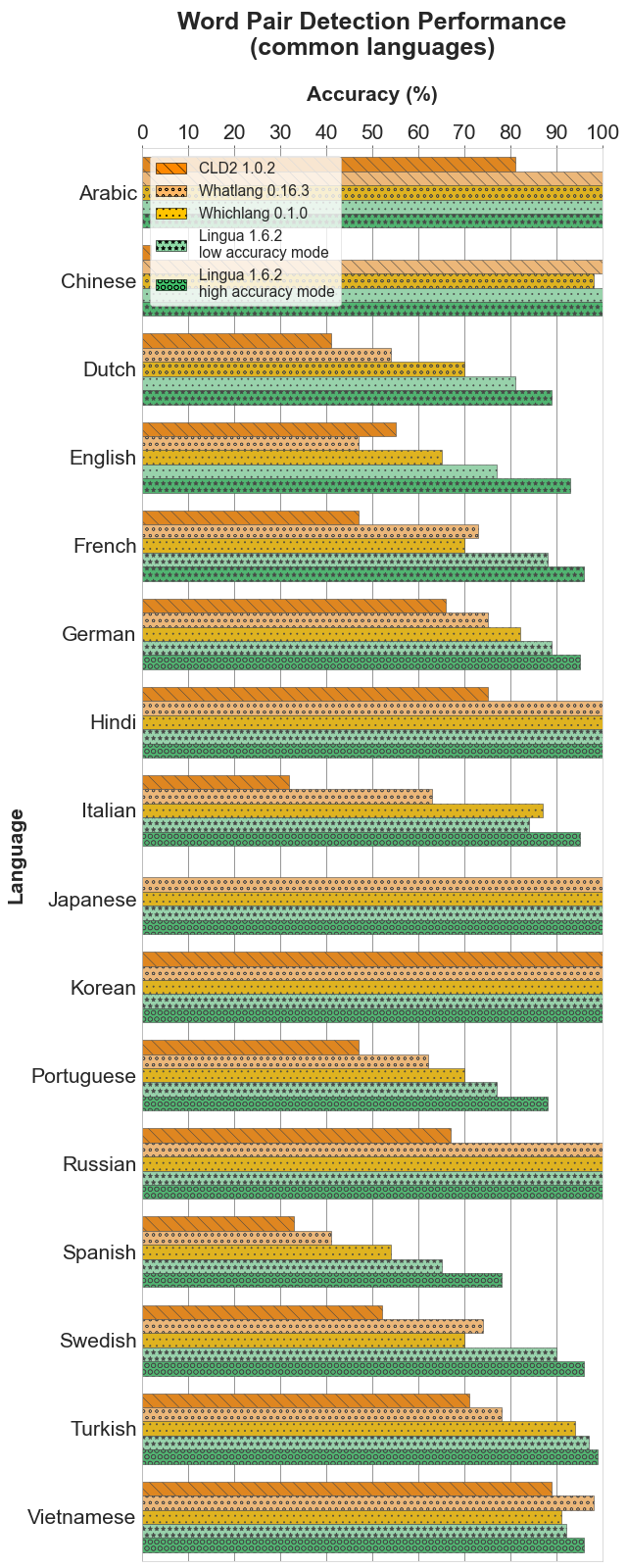
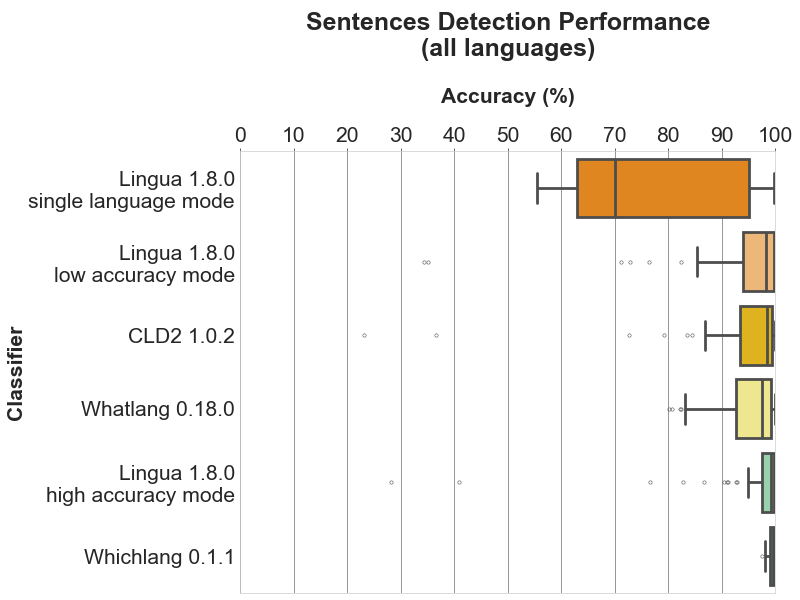
Bar plot

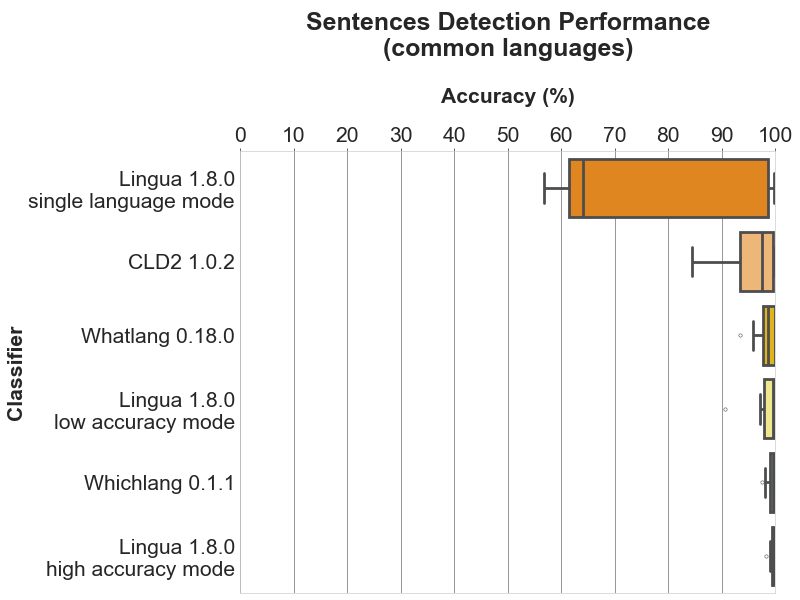
Bar plot
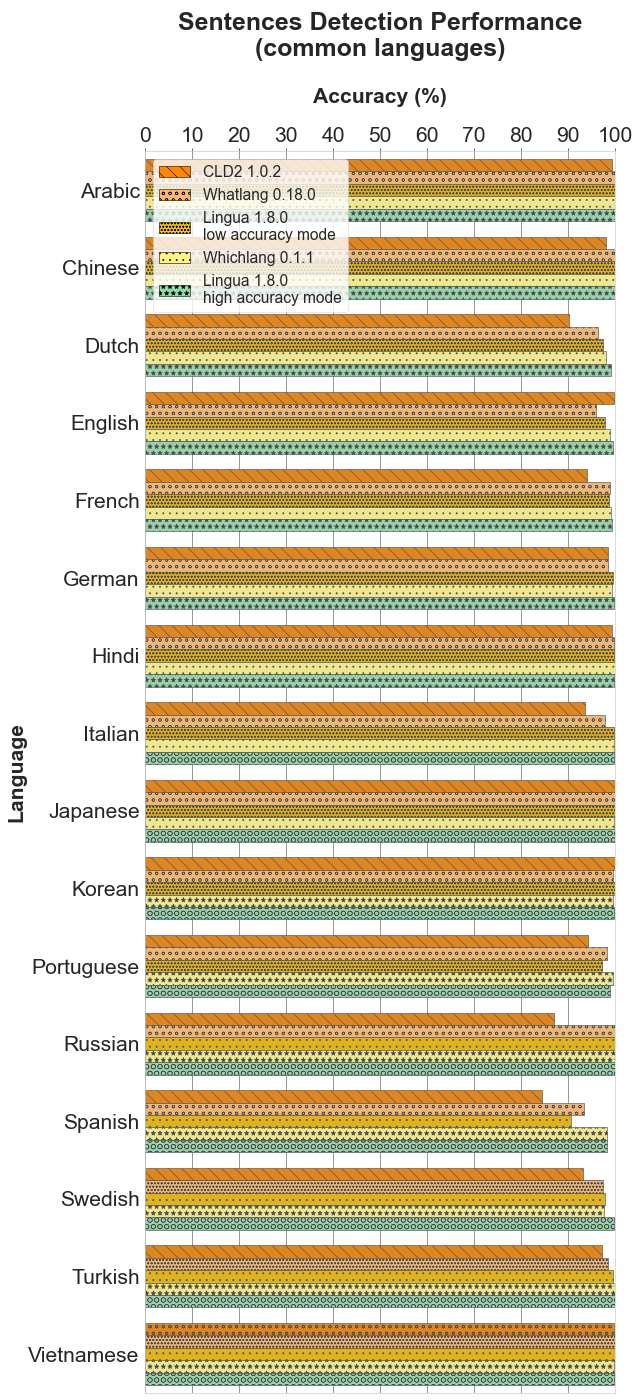
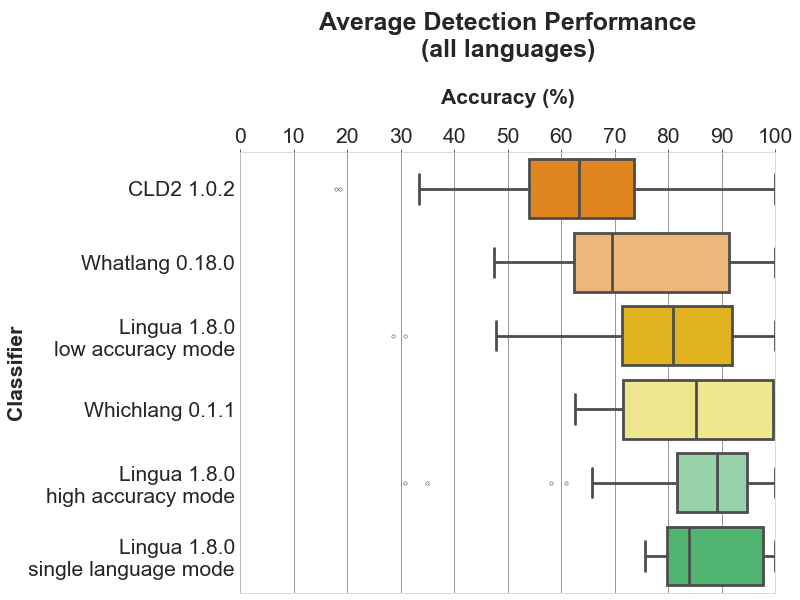
Bar plot

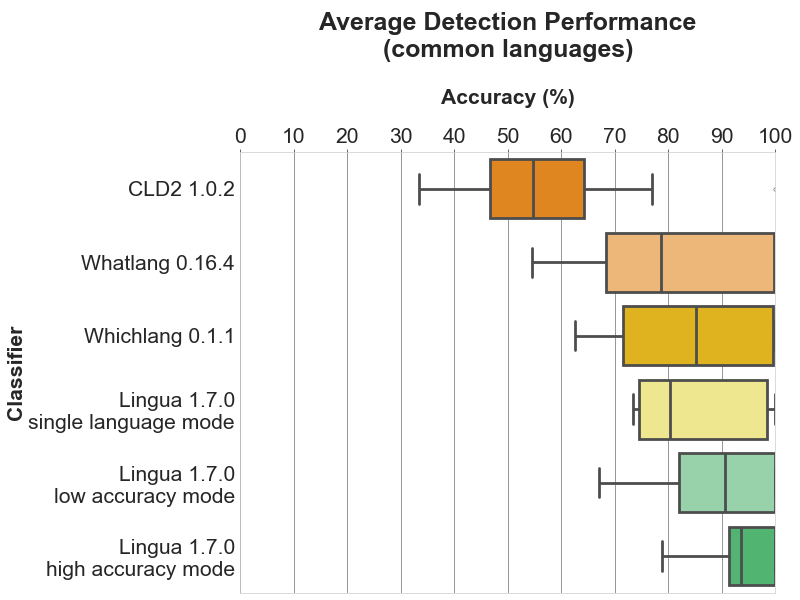
Bar plot
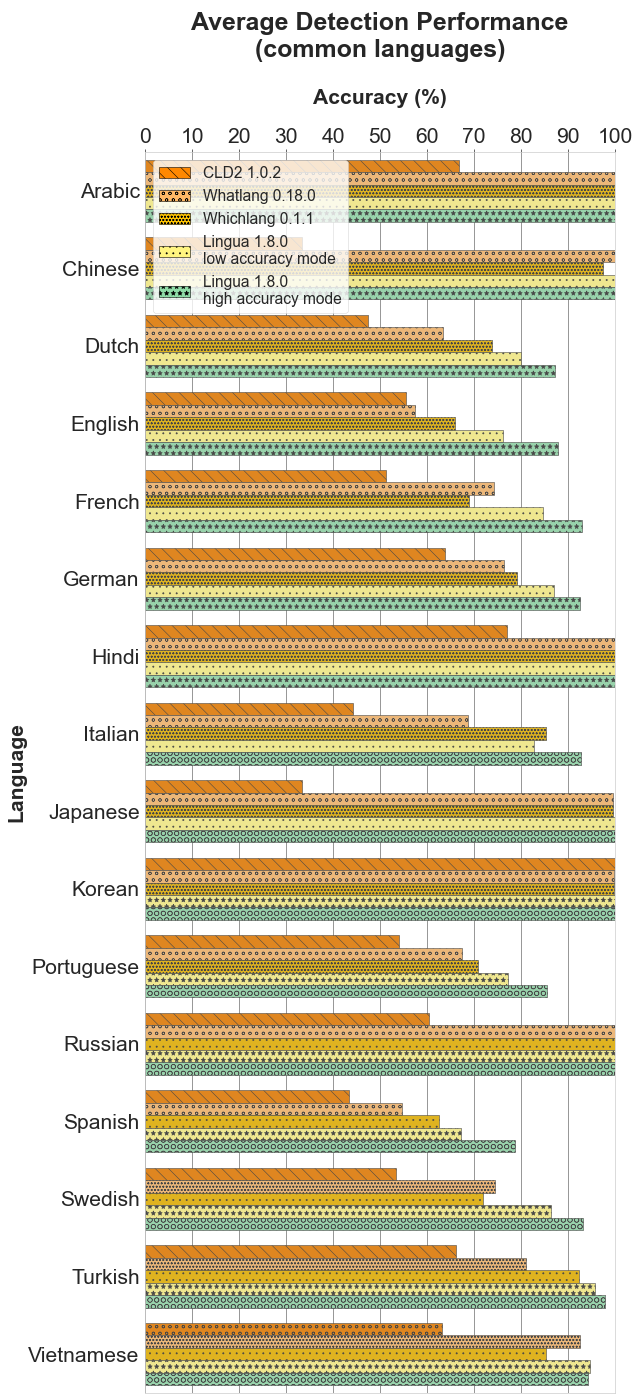
The tables below show detailed statistics for each language and classifier including mean, median and standard deviation.
Open table
Language
Average
Single Words
Word Pairs
Sentences
Lingua
(high accuracy mode)Lingua
(low accuracy mode)Whichlang
Whatlang
CLD2
Lingua
(high accuracy mode)Lingua
(low accuracy mode)Whichlang
Whatlang
CLD2
Lingua
(high accuracy mode)Lingua
(low accuracy mode)Whichlang
Whatlang
CLD2
Lingua
(high accuracy mode)Lingua
(low accuracy mode)Whichlang
Whatlang
CLD2
Afrikaans
 78
78 64
64 -
- 51
51 55
55 58
58 37
37 -
- 22
22 12
12 80
80 62
62 -
- 41
41 56
56 96
96 93
93 -
- 92
92 96
96
Albanian
 87
87 79
79 -
- -
- 64
64 68
68 54
54 -
- -
- 18
18 94
94 86
86 -
- -
- 76
76 99
99 98
98 -
- -
- 99
99
Arabic
 98
98 94
94 100
100 93
93 66
66 96
96 88
88 100
100 88
88 19
19 99
99 95
95 100
100 92
92 81
81 99
99 99
99 100
100 99
99 99
99
Armenian
 100
100 100
100 -
- -
- 100
100 100
100 100
100 -
- -
- 100
100 100
100 100
100 -
- -
- 100
100 100
100 100
100 -
- -
- 100
100
Azerbaijani
 89
89 82
82 -
- 79
79 71
71 77
77 71
71 -
- 61
61 34
34 92
92 78
78 -
- 81
81 81
81 99
99 96
96 -
- 97
97 99
99
Basque
 83
83 74
74 -
- -
- 61
61 71
71 55
55 -
- -
- 22
22 87
87 76
76 -
- -
- 69
69 92
92 91
91 -
- -
- 91
91
Belarusian
 96
96 91
91 -
- 91
91 75
75 91
91 80
80 -
- 81
81 42
42 99
99 95
95 -
- 94
94 87
87 99
99 99
99 -
- 99
99 98
98
Bengali
 100
100 100
100 -
- 99
99 62
62 100
100 100
100 -
- 100
100 19
19 100
100 100
100 -
- 100
100 69
69 100
100 100
100 -
- 99
99 99
99
Bokmal
 58
58 49
49 -
- 49
49 -
- 38
38 27
27 -
- 24
24 -
- 58
58 47
47 -
- 44
44 -
- 76
76 74
74 -
- 80
80 -
-
Bosnian
 34
34 29
29 -
- -
- 18
18 29
29 22
22 -
- -
- 4
4 34
34 28
28 -
- -
- 15
15 40
40 36
36 -
- -
- 36
36
Bulgarian
 86
86 77
77 -
- 69
69 65
65 70
70 56
56 -
- 44
44 31
31 91
91 80
80 -
- 67
67 72
72 98
98 96
96 -
- 96
96 92
92
Catalan
 70
70 58
58 -
- 51
51 37
37 50
50 33
33 -
- 29
29 4
4 73
73 60
60 -
- 45
45 29
29 86
86 81
81 -
- 80
80 79
79
Chinese
 100
100 100
100 97
97 100
100 33
33 100
100 100
100 93
93 100
100 -
- 100
100 100
100 98
98 100
100 2
2 100
100 100
100 100
100 100
100 98
98
Croatian
 72
72 59
59 -
- 61
61 51
51 53
53 36
36 -
- 34
34 33
33 74
74 57
57 -
- 54
54 46
46 90
90 85
85 -
- 94
94 72
72
Czech
 80
80 70
70 -
- 63
63 73
73 65
65 54
54 -
- 42
42 50
50 84
84 71
71 -
- 66
66 79
79 91
91 87
87 -
- 82
82 90
90
Danish
 81
81 70
70 -
- 53
53 59
59 61
61 45
45 -
- 31
31 26
26 83
83 70
70 -
- 45
45 56
56 97
97 95
95 -
- 84
84 94
94
Dutch
 77
77 63
63 73
73 47
47 47
47 55
55 35
35 53
53 22
22 10
10 80
80 61
61 70
70 37
37 41
41 96
96 94
94 98
98 82
82 90
90
English
 80
80 62
62 66
66 49
49 55
55 54
54 29
29 34
34 17
17 11
11 88
88 62
62 65
65 35
35 55
55 99
99 96
96 98
98 94
94 99
99
Esperanto
 83
83 65
65 -
- 58
58 50
50 67
67 43
43 -
- 32
32 7
7 85
85 60
60 -
- 53
53 45
45 98
98 92
92 -
- 90
90 97
97
Estonian
 91
91 83
83 -
- 67
67 65
65 79
79 62
62 -
- 43
43 23
23 96
96 87
87 -
- 62
62 73
73 99
99 99
99 -
- 96
96 99
99
Finnish
 96
96 90
90 -
- 76
76 77
77 90
90 77
77 -
- 53
53 43
43 98
98 94
94 -
- 78
78 89
89 99
99 99
99 -
- 98
98 99
99
French
 89
89 77
77 68
68 63
63 51
51 74
74 51
51 36
36 35
35 12
12 94
94 82
82 70
70 59
59 47
47 99
99 97
97 99
99 97
97 93
93
Ganda
 91
91 83
83 -
- -
- 61
61 79
79 64
64 -
- -
- 23
23 95
95 86
86 -
- -
- 62
62 100
100 99
99 -
- -
- 98
98
Georgian
 99
99 99
99 -
- 99
99 100
100 100
100 100
100 -
- 100
100 100
100 100
100 100
100 -
- 100
100 100
100 99
99 99
99 -
- 99
99 100
100
German
 89
89 79
79 79
79 69
69 63
63 73
73 56
56 55
55 44
44 26
26 94
94 83
83 82
82 66
66 66
66 99
99 99
99 99
99 98
98 98
98
Greek
 100
100 100
100 -
- 99
99 100
100 100
100 100
100 -
- 100
100 100
100 100
100 100
100 -
- 100
100 100
100 100
100 100
100 -
- 99
99 100
100
Gujarati
 99
99 99
99 -
- 99
99 99
99 99
99 99
99 -
- 100
100 99
99 100
100 100
100 -
- 100
100 100
100 100
100 100
100 -
- 99
99 100
100
Hebrew
 99
99 99
99 -
- 95
95 -
- 100
100 100
100 -
- 92
92 -
- 100
100 100
100 -
- 95
95 -
- 99
99 99
99 -
- 99
99 -
-
Hindi
 73
73 32
32 100
100 68
68 76
76 60
60 11
11 100
100 54
54 55
55 64
64 19
19 100
100 54
54 75
75 94
94 67
67 100
100 96
96 99
99
Hungarian
 94
94 90
90 -
- 72
72 75
75 86
86 77
77 -
- 50
50 40
40 97
97 93
93 -
- 70
70 85
85 100
100 99
99 -
- 98
98 99
99
Icelandic
 93
93 87
87 -
- -
- 65
65 82
82 71
71 -
- -
- 25
25 96
96 92
92 -
- -
- 73
73 99
99 99
99 -
- -
- 99
99
Indonesian
 60
60 47
47 -
- 69
69 62
62 39
39 25
25 -
- 42
42 36
36 60
60 45
45 -
- 69
69 62
62 82
82 71
71 -
- 95
95 88
88
Irish
 90
90 85
85 -
- -
- 66
66 81
81 70
70 -
- -
- 29
29 94
94 90
90 -
- -
- 77
77 95
95 94
94 -
- -
- 92
92
Italian
 86
86 71
71 85
85 56
56 44
44 69
69 41
41 68
68 25
25 6
6 91
91 73
73 87
87 48
48 32
32 99
99 98
98 99
99 96
96 93
93
Japanese
 100
100 100
100 99
99 99
99 33
33 100
100 100
100 98
98 98
98 -
- 100
100 100
100 100
100 100
100 -
- 100
100 100
100 99
99 100
100 100
100
Kazakh
 91
91 90
90 -
- -
- 76
76 79
79 78
78 -
- -
- 43
43 96
96 92
92 -
- -
- 87
87 99
99 98
98 -
- -
- 99
99
Korean
 99
99 99
99 99
99 99
99 99
99 100
100 100
100 100
100 100
100 100
100 100
100 100
100 100
100 100
100 100
100 99
99 99
99 99
99 99
99 99
99
Latin
 87
87 73
73 -
- 55
55 46
46 72
72 49
49 -
- 36
36 8
8 92
92 75
75 -
- 51
51 42
42 97
97 94
94 -
- 79
79 88
88
Latvian
 93
93 87
87 -
- 85
85 72
72 84
84 74
74 -
- 70
70 33
33 96
96 90
90 -
- 86
86 84
84 98
98 96
96 -
- 97
97 98
98
Lithuanian
 94
94 87
87 -
- 79
79 70
70 86
86 75
75 -
- 59
59 29
29 97
97 88
88 -
- 81
81 81
81 99
99 98
98 -
- 97
97 99
99
Macedonian
 83
83 72
72 -
- 66
66 60
60 65
65 51
51 -
- 43
43 27
27 86
86 70
70 -
- 60
60 69
69 98
98 95
95 -
- 96
96 83
83
Malay
 30
30 30
30 -
- -
- 17
17 26
26 21
21 -
- -
- 9
9 38
38 35
35 -
- -
- 21
21 28
28 35
35 -
- -
- 23
23
Maori
 92
92 83
83 -
- -
- 60
60 84
84 63
63 -
- -
- 12
12 92
92 87
87 -
- -
- 71
71 99
99 97
97 -
- -
- 98
98
Marathi
 85
85 39
39 -
- 78
78 83
83 73
73 15
15 -
- 59
59 65
65 84
84 29
29 -
- 80
80 86
86 96
96 71
71 -
- 94
94 98
98
Mongolian
 96
96 95
95 -
- -
- 78
78 92
92 89
89 -
- -
- 43
43 98
98 97
97 -
- -
- 92
92 99
99 99
99 -
- -
- 99
99
Nynorsk
 65
65 51
51 -
- -
- 54
54 40
40 25
25 -
- -
- 18
18 65
65 49
49 -
- -
- 50
50 90
90 81
81 -
- -
- 93
93
Persian
 90
90 80
80 -
- 72
72 61
61 77
77 61
61 -
- 49
49 12
12 93
93 80
80 -
- 68
68 72
72 99
99 97
97 -
- 99
99 99
99
Polish
 94
94 89
89 -
- 81
81 74
74 85
85 76
76 -
- 63
63 37
37 98
98 93
93 -
- 81
81 86
86 99
99 99
99 -
- 99
99 99
99
Portuguese
 81
81 68
68 70
70 60
60 53
53 59
59 41
41 42
42 30
30 19
19 85
85 69
69 70
70 52
52 47
47 98
98 95
95 99
99 97
97 94
94
Punjabi
 99
99 99
99 -
- 99
99 100
100 100
100 100
100 -
- 100
100 100
100 100
100 100
100 -
- 100
100 100
100 99
99 99
99 -
- 99
99 100
100
Romanian
 86
86 72
72 -
- 66
66 53
53 68
68 49
49 -
- 45
45 11
11 91
91 73
73 -
- 62
62 53
53 99
99 94
94 -
- 90
90 96
96
Russian
 89
89 78
78 100
100 67
67 60
60 76
76 59
59 100
100 51
51 26
26 94
94 83
83 100
100 66
66 67
67 97
97 92
92 100
100 84
84 86
86
Serbian
 87
87 77
77 -
- 66
66 68
68 73
73 61
61 -
- 46
46 29
29 90
90 79
79 -
- 63
63 77
77 99
99 91
91 -
- 89
89 99
99
Shona
 91
91 80
80 -
- 76
76 64
64 77
77 56
56 -
- 55
55 23
23 95
95 86
86 -
- 76
76 71
71 100
100 99
99 -
- 98
98 99
99
Slovak
 84
84 75
75 -
- 64
64 71
71 64
64 49
49 -
- 40
40 37
37 90
90 78
78 -
- 60
60 75
75 98
98 97
97 -
- 93
93 99
99
Slovene
 82
82 66
66 -
- 52
52 47
47 61
61 39
39 -
- 29
29 8
8 86
86 67
67 -
- 43
43 42
42 98
98 93
93 -
- 83
83 92
92
Somali
 92
92 84
84 -
- -
- 69
69 81
81 64
64 -
- -
- 26
26 95
95 90
90 -
- -
- 83
83 99
99 99
99 -
- -
- 99
99
Sotho
 85
85 71
71 -
- -
- 53
53 66
66 42
42 -
- -
- 12
12 90
90 74
74 -
- -
- 54
54 99
99 97
97 -
- -
- 95
95
Spanish
 69
69 56
56 62
62 47
47 43
43 43
43 25
25 35
35 18
18 12
12 68
68 48
48 54
54 32
32 33
33 97
97 93
93 98
98 91
91 84
84
Swahili
 80
80 69
69 -
- -
- 57
57 60
60 43
43 -
- -
- 15
15 84
84 68
68 -
- -
- 58
58 98
98 96
96 -
- -
- 97
97
Swedish
 83
83 72
72 71
71 61
61 53
53 64
64 45
45 47
47 34
34 14
14 88
88 75
75 70
70 57
57 52
52 98
98 94
94 97
97 92
92 93
93
Tagalog
 77
77 66
66 -
- -
- 50
50 52
52 35
35 -
- -
- 9
9 83
83 66
66 -
- -
- 44
44 98
98 96
96 -
- -
- 96
96
Tamil
 100
100 100
100 -
- 100
100 100
100 100
100 100
100 -
- 100
100 100
100 100
100 100
100 -
- 100
100 100
100 100
100 100
100 -
- 100
100 100
100
Telugu
 100
100 100
100 -
- 99
99 100
100 100
100 100
100 -
- 100
100 100
100 100
100 100
100 -
- 100
100 100
100 100
100 100
100 -
- 99
99 100
100
Thai
 99
99 99
99 -
- 99
99 99
99 100
100 100
100 -
- 100
100 100
100 100
100 100
100 -
- 100
100 100
100 99
99 99
99 -
- 99
99 99
99
Tsonga
 84
84 72
72 -
- -
- 61
61 66
66 46
46 -
- -
- 19
19 89
89 73
73 -
- -
- 67
67 98
98 96
96 -
- -
- 97
97
Tswana
 84
84 71
71 -
- -
- 56
56 65
65 44
44 -
- -
- 17
17 88
88 73
73 -
- -
- 57
57 98
98 96
96 -
- -
- 94
94
Turkish
 93
93 87
87 92
92 63
63 66
66 83
83 70
70 83
83 39
39 30
30 97
97 91
91 94
94 59
59 71
71 99
99 99
99 99
99 91
91 97
97
Ukrainian
 92
92 86
86 -
- 85
85 77
77 84
84 74
74 -
- 69
69 45
45 97
97 91
91 -
- 88
88 87
87 95
95 92
92 -
- 98
98 98
98
Urdu
 90
90 79
79 -
- 68
68 61
61 80
80 64
64 -
- 45
45 8
8 94
94 78
78 -
- 63
63 75
75 97
97 96
96 -
- 95
95 99
99
Vietnamese
 90
90 87
87 85
85 91
91 63
63 78
78 75
75 64
64 75
75 -
- 94
94 87
87 91
91 97
97 89
89 99
99 98
98 99
99 99
99 99
99
Welsh
 91
91 82
82 -
- -
- 72
72 78
78 60
60 -
- -
- 34
34 95
95 87
87 -
- -
- 85
85 99
99 98
98 -
- -
- 98
98
Xhosa
 82
82 68
68 -
- -
- 71
71 63
63 44
44 -
- -
- 45
45 85
85 67
67 -
- -
- 70
70 98
98 93
93 -
- -
- 97
97
Yoruba
 74
74 62
62 -
- -
- 36
36 50
50 33
33 -
- -
- 1
1 76
76 60
60 -
- -
- 22
22 96
96 92
92 -
- -
- 87
87
Zulu
 80
80 70
70 -
- 76
76 54
54 62
62 45
45 -
- 53
53 18
18 83
83 71
71 -
- 77
77 51
51 97
97 94
94 -
- 99
99 93
93
Mean
 86
86 77
77 84
84 74
74 64
64 74
74 60
60 69
69 57
57 34
34 89
89 78
78 84
84 71
71 68
68 96
96 93
93 99
99 94
94 94
94
Median
89.0
79.0
85.0
69.0
63.0
74.0
56.0
66.0
49.5
26.0
93.0
80.0
89.0
67.5
71.0
99.0
96.0
99.0
97.0
98.0
Standard Deviation
13.15
17.33
14.21
17.27
18.54
18.47
25.01
26.6
27.23
28.81
13.24
19.09
15.66
21.07
22.74
11.06
11.85
0.85
6.04
12.16
Open table
Language
Average
Single Words
Word Pairs
Sentences
Lingua
(high accuracy mode)Lingua
(low accuracy mode)Whichlang
Whatlang
CLD2
Lingua
(high accuracy mode)Lingua
(low accuracy mode)Whichlang
Whatlang
CLD2
Lingua
(high accuracy mode)Lingua
(low accuracy mode)Whichlang
Whatlang
CLD2
Lingua
(high accuracy mode)Lingua
(low accuracy mode)Whichlang
Whatlang
CLD2
Arabic
 100
100 100
100 100
100 100
100 66
66 100
100 100
100 100
100 100
100 19
19 100
100 100
100 100
100 100
100 81
81 100
100 100
100 100
100 100
100 99
99
Chinese
 100
100 100
100 97
97 100
100 33
33 100
100 100
100 93
93 100
100 -
- 100
100 100
100 98
98 100
100 2
2 100
100 100
100 100
100 100
100 98
98
Dutch
 87
87 80
80 73
73 63
63 47
47 73
73 60
60 53
53 39
39 10
10 89
89 81
81 70
70 54
54 41
41 99
99 98
98 98
98 96
96 90
90
English
 87
87 76
76 66
66 57
57 55
55 70
70 52
52 34
34 29
29 11
11 93
93 77
77 65
65 47
47 55
55 99
99 98
98 98
98 95
95 99
99
French
 92
92 84
84 68
68 74
74 51
51 82
82 65
65 36
36 50
50 12
12 96
96 88
88 70
70 73
73 47
47 99
99 98
98 99
99 98
98 93
93
German
 92
92 86
86 79
79 76
76 63
63 82
82 70
70 55
55 54
54 26
26 95
95 89
89 82
82 75
75 66
66 99
99 99
99 99
99 98
98 98
98
Hindi
 100
100 99
99 100
100 99
99 76
76 100
100 100
100 100
100 100
100 55
55 100
100 100
100 100
100 100
100 75
75 100
100 99
99 100
100 99
99 99
99
Italian
 92
92 82
82 85
85 68
68 44
44 82
82 63
63 68
68 45
45 6
6 95
95 84
84 87
87 63
63 32
32 99
99 99
99 99
99 97
97 93
93
Japanese
 100
100 100
100 99
99 99
99 33
33 100
100 100
100 98
98 98
98 -
- 100
100 100
100 100
100 100
100 -
- 100
100 100
100 99
99 100
100 100
100
Korean
 99
99 99
99 99
99 99
99 99
99 100
100 100
100 100
100 100
100 100
100 100
100 100
100 100
100 100
100 100
100 99
99 99
99 99
99 99
99 99
99
Portuguese
 85
85 76
76 70
70 67
67 53
53 69
69 55
55 42
42 42
42 19
19 88
88 77
77 70
70 62
62 47
47 99
99 97
97 99
99 98
98 94
94
Russian
 100
100 100
100 100
100 100
100 60
60 100
100 100
100 100
100 100
100 26
26 100
100 100
100 100
100 100
100 67
67 100
100 100
100 100
100 100
100 86
86
Spanish
 78
78 69
69 62
62 54
54 43
43 59
59 46
46 35
35 29
29 12
12 78
78 65
65 54
54 41
41 33
33 98
98 95
95 98
98 93
93 84
84
Swedish
 93
93 86
86 71
71 74
74 53
53 83
83 69
69 47
47 51
51 14
14 96
96 90
90 70
70 74
74 52
52 99
99 98
98 97
97 97
97 93
93
Turkish
 97
97 95
95 92
92 81
81 66
66 94
94 89
89 83
83 66
66 30
30 99
99 97
97 94
94 78
78 71
71 100
100 99
99 99
99 98
98 97
97
Vietnamese
 94
94 91
91 85
85 92
92 63
63 86
86 83
83 64
64 79
79 -
- 96
96 92
92 91
91 98
98 89
89 99
99 99
99 99
99 99
99 99
99
Mean
 94
94 89
89 84
84 81
81 57
57 86
86 78
78 69
69 68
68 26
26 95
95 90
90 84
84 79
79 57
57 99
99 99
99 99
99 98
98 95
95
Median
93.5
88.5
85.0
78.5
54.0
84.5
76.5
66.0
60.0
19.0
96.0
91.0
89.0
76.5
55.0
99.0
99.0
99.0
98.0
97.5
Standard Deviation
6.62
10.44
14.21
16.91
16.44
13.51
20.23
26.6
28.33
25.57
6.03
10.76
15.66
21.17
25.16
0.6
1.31
0.85
1.98
4.95
Various benchmarks for all classifiers can be run via:
cargo bench --features benchmark
The benchmarks measure the processing time for classifying 2,000 sentences available in the common 16 languages that are supported by each language detector. The results below have been produced on an iMac 3.6 Ghz 8-Core Intel Core i9 with 40 GB RAM. Whichlang has the shortest processing time, Lingua the longest.
| | Single Thread | Multiple Threads | |--------------------------------------------------|-------------------|----------------------| | Lingua / high accuracy mode / all languages | 622.00 ms | 96.648 ms | | Lingua / high accuracy mode / common languages | 333.31 ms | 37.347 ms | | Lingua / low accuracy mode / all languages | 373.15 ms | 48.182 ms | | Lingua / low accuracy mode / common languages | 180.54 ms | 24.550 ms | | Whichlang | 2.0458 ms | 351.03 µs | | Whatlang / all languages | 113.08 ms | 12.992 ms | | Whatlang / common languages | 47.742 ms | 5.6070 ms | | CLD 2 | 8.9223 ms | 2.0528 ms |
Every language detector uses a probabilistic n-gram model trained on the character distribution in some training corpus. Most libraries only use n-grams of size 3 (trigrams) which is satisfactory for detecting the language of longer text fragments consisting of multiple sentences. For short phrases or single words, however, trigrams are not enough. The shorter the input text is, the less n-grams are available. The probabilities estimated from such few n-grams are not reliable. This is why Lingua makes use of n-grams of sizes 1 up to 5 which results in much more accurate prediction of the correct language.
A second important difference is that Lingua does not only use such a statistical model, but also a rule-based engine. This engine first determines the alphabet of the input text and searches for characters which are unique in one or more languages. If exactly one language can be reliably chosen this way, the statistical model is not necessary anymore. In any case, the rule-based engine filters out languages that do not satisfy the conditions of the input text. Only then, in a second step, the probabilistic n-gram model is taken into consideration. This makes sense because loading less language models means less memory consumption and better runtime performance.
In general, it is always a good idea to restrict the set of languages to be considered in the classification process using the respective api methods. If you know beforehand that certain languages are never to occur in an input text, do not let those take part in the classifcation process. The filtering mechanism of the rule-based engine is quite good, however, filtering based on your own knowledge of the input text is always preferable.
If you want to reproduce the accuracy results above, you can generate the test reports yourself for all classifiers and all languages by doing:
cargo run --release --bin accuracy_reports --features accuracy-reports
It is important to use the --release flag here because loading the language models in debug mode takes too much time.
For each detector and language, a test report file is then written into
/accuracy-reports,
to be found next to the src directory. As an example, here is the current output of the Lingua German report:
```
Accuracy on average: 89.23%
Detection of 1000 single words (average length: 9 chars) Accuracy: 73.9% Erroneously classified as Dutch: 2.3%, Danish: 2.1%, English: 2%, Latin: 1.9%, Bokmal: 1.6%, Basque: 1.2%, Esperanto: 1.2%, French: 1.2%, Italian: 1.2%, Swedish: 1%, Afrikaans: 0.8%, Tsonga: 0.7%, Nynorsk: 0.6%, Spanish: 0.6%, Yoruba: 0.6%, Finnish: 0.5%, Sotho: 0.5%, Welsh: 0.5%, Estonian: 0.4%, Irish: 0.4%, Polish: 0.4%, Swahili: 0.4%, Tagalog: 0.4%, Tswana: 0.4%, Bosnian: 0.3%, Icelandic: 0.3%, Romanian: 0.3%, Albanian: 0.2%, Catalan: 0.2%, Croatian: 0.2%, Indonesian: 0.2%, Lithuanian: 0.2%, Maori: 0.2%, Turkish: 0.2%, Xhosa: 0.2%, Zulu: 0.2%, Latvian: 0.1%, Malay: 0.1%, Slovak: 0.1%, Slovene: 0.1%, Somali: 0.1%
Detection of 1000 word pairs (average length: 18 chars) Accuracy: 94.1% Erroneously classified as Dutch: 0.9%, Latin: 0.8%, English: 0.7%, Swedish: 0.6%, Danish: 0.5%, French: 0.4%, Bokmal: 0.3%, Irish: 0.2%, Tagalog: 0.2%, Afrikaans: 0.1%, Esperanto: 0.1%, Estonian: 0.1%, Finnish: 0.1%, Italian: 0.1%, Maori: 0.1%, Nynorsk: 0.1%, Somali: 0.1%, Swahili: 0.1%, Tsonga: 0.1%, Turkish: 0.1%, Welsh: 0.1%, Zulu: 0.1%
Detection of 1000 sentences (average length: 111 chars) Accuracy: 99.7% Erroneously classified as Dutch: 0.2%, Latin: 0.1% ```
Add Lingua to your Cargo.toml file like so:
toml
[dependencies]
lingua = "1.5.0"
By default, this will download the language model dependencies for all 75 supported languages,
a total of approximately 90 MB. If your bandwidth or hard drive space is limited, or you simply
do not need all languages, you can specify a subset of the language models to be downloaded as
separate features in your Cargo.toml:
toml
[dependencies]
lingua = { version = "1.5.0", default-features = false, features = ["french", "italian", "spanish"] }
In order to build the source code yourself, you need the stable Rust toolchain installed on your machine so that cargo, the Rust package manager is available.
git clone https://github.com/pemistahl/lingua-rs.git
cd lingua-rs
cargo build
The source code is accompanied by an extensive unit test suite. To run them, simply say:
cargo test
```rust use lingua::{Language, LanguageDetector, LanguageDetectorBuilder}; use lingua::Language::{English, French, German, Spanish};
let languages = vec![English, French, German, Spanish];
let detector: LanguageDetector = LanguageDetectorBuilder::fromlanguages(&languages).build();
let detectedlanguage: Option
asserteq!(detectedlanguage, Some(English)); ```
By default, Lingua returns the most likely language for a given input text. However, there are certain words that are spelled the same in more than one language. The word prologue, for instance, is both a valid English and French word. Lingua would output either English or French which might be wrong in the given context. For cases like that, it is possible to specify a minimum relative distance that the logarithmized and summed up probabilities for each possible language have to satisfy. It can be stated in the following way:
```rust use lingua::LanguageDetectorBuilder; use lingua::Language::{English, French, German, Spanish};
let detector = LanguageDetectorBuilder::fromlanguages(&[English, French, German, Spanish]) .withminimumrelativedistance(0.9) .build(); let detectedlanguage = detector.detectlanguage_of("languages are awesome");
asserteq!(detectedlanguage, None); ```
Be aware that the distance between the language probabilities is dependent on the length of the
input text. The longer the input text, the larger the distance between the languages. So if you
want to classify very short text phrases, do not set the minimum relative distance too high.
Otherwise None will be
returned most of the time as in the example above. This is the return value for cases where
language detection is not reliably possible.
Knowing about the most likely language is nice but how reliable is the computed likelihood? And how less likely are the other examined languages in comparison to the most likely one? These questions can be answered as well:
```rust use lingua::Language::{English, French, German, Spanish}; use lingua::LanguageDetectorBuilder;
fn main() {
let languages = vec![English, French, German, Spanish];
let detector = LanguageDetectorBuilder::fromlanguages(&languages).build();
let confidencevalues = detector
.computelanguageconfidencevalues("languages are awesome")
.intoiter()
.map(|(language, confidence)| (language, (confidence * 100.0).round() / 100.0))
.collect::
assert_eq!(
confidence_values,
vec![
(English, 0.93),
(French, 0.04),
(German, 0.02),
(Spanish, 0.01)
]
);
} ```
In the example above, a vector of two-element tuples is returned containing all possible languages sorted by their confidence value in descending order. Each value is a probability between 0.0 and 1.0. The probabilities of all languages will sum to 1.0. If the language is unambiguously identified by the rule engine, the value 1.0 will always be returned for this language. The other languages will receive a value of 0.0.
There is also a method for returning the confidence value for one specific language only:
```rust use lingua::Language::{English, French, German, Spanish}; use lingua::LanguageDetectorBuilder;
fn main() { let languages = vec![English, French, German, Spanish]; let detector = LanguageDetectorBuilder::fromlanguages(&languages).build(); let confidence = detector.computelanguageconfidence("languages are awesome", French); let roundedconfidence = (confidence * 100.0).round() / 100.0;
assert_eq!(rounded_confidence, 0.04);
} ```
The value that this method computes is a number between 0.0 and 1.0. If the language is unambiguously identified by the rule engine, the value 1.0 will always be returned. If the given language is not supported by this detector instance, the value 0.0 will always be returned.
By default, Lingua uses lazy-loading to load only those language models on demand which are considered relevant by the rule-based filter engine. For web services, for instance, it is rather beneficial to preload all language models into memory to avoid unexpected latency while waiting for the service response. If you want to enable the eager-loading mode, you can do it like this:
rust
LanguageDetectorBuilder::from_all_languages().with_preloaded_language_models().build();
Multiple instances of LanguageDetector share the same language models in memory which are
accessed asynchronously by the instances.
Lingua's high detection accuracy comes at the cost of being noticeably slower than other language detectors. The large language models also consume significant amounts of memory. These requirements might not be feasible for systems running low on resources. If you want to classify mostly long texts or need to save resources, you can enable a low accuracy mode that loads only a small subset of the language models into memory:
rust
LanguageDetectorBuilder::from_all_languages().with_low_accuracy_mode().build();
The downside of this approach is that detection accuracy for short texts consisting of less than 120 characters will drop significantly. However, detection accuracy for texts which are longer than 120 characters will remain mostly unaffected.
In high accuracy mode (the default), the language detector consumes approximately 970 MB of memory if all language models are loaded. In low accuracy mode, memory consumption is reduced to approximately 72 MB. The goal is to further reduce memory consumption in later releases.
An alternative for a smaller memory footprint and faster performance is to reduce the set of languages when building the language detector. In most cases, it is not advisable to build the detector from all supported languages. When you have knowledge about the texts you want to classify you can almost always rule out certain languages as impossible or unlikely to occur.
In contrast to most other language detectors, Lingua is able to detect multiple languages in mixed-language texts. This feature can yield quite reasonable results, but it is still in an experimental state and therefore the detection result is highly dependent on the input text. It works best in high-accuracy mode with multiple long words for each language. The shorter the phrases and their words are, the less accurate are the results. Reducing the set of languages when building the language detector can also improve accuracy for this task if the languages occurring in the text are equal to the languages supported by the respective language detector instance.
```rust use lingua::DetectionResult; use lingua::Language::{English, French, German}; use lingua::LanguageDetectorBuilder;
fn main() { let languages = vec![English, French, German]; let detector = LanguageDetectorBuilder::from_languages(&languages).build(); let sentence = "Parlez-vous français? \ Ich spreche Französisch nur ein bisschen. \ A little bit is better than nothing.";
let results: Vec<DetectionResult> = detector.detect_multiple_languages_of(sentence);
if let [first, second, third] = &results[..] {
assert_eq!(first.language(), French);
assert_eq!(
&sentence[first.start_index()..first.end_index()],
"Parlez-vous français? "
);
assert_eq!(second.language(), German);
assert_eq!(
&sentence[second.start_index()..second.end_index()],
"Ich spreche Französisch nur ein bisschen. "
);
assert_eq!(third.language(), English);
assert_eq!(
&sentence[third.start_index()..third.end_index()],
"A little bit is better than nothing."
);
}
} ```
In the example above, a vector of DetectionResult
is returned. Each entry in the vector describes a contiguous single-language text section,
providing start and end indices of the respective substring.
There might be classification tasks where you know beforehand that your language data is definitely not written in Latin, for instance (what a surprise :-). The detection accuracy can become better in such cases if you exclude certain languages from the decision process or just explicitly include relevant languages:
```rust use lingua::{LanguageDetectorBuilder, Language, IsoCode6391, IsoCode6393};
// Include all languages available in the library. LanguageDetectorBuilder::fromalllanguages();
// Include only languages that are not yet extinct (= currently excludes Latin). LanguageDetectorBuilder::fromallspoken_languages();
// Include only languages written with Cyrillic script. LanguageDetectorBuilder::fromalllanguageswithcyrillic_script();
// Exclude only the Spanish language from the decision algorithm. LanguageDetectorBuilder::fromalllanguages_without(&[Language::Spanish]);
// Only decide between English and German. LanguageDetectorBuilder::from_languages(&[Language::English, Language::German]);
// Select languages by ISO 639-1 code. LanguageDetectorBuilder::fromisocodes6391(&[IsoCode6391::EN, IsoCode6391::DE]);
// Select languages by ISO 639-3 code. LanguageDetectorBuilder::fromisocodes6393(&[IsoCode6393::ENG, IsoCode6393::DEU]); ```
This library can be compiled to WebAssembly (WASM) which allows to use Lingua in any JavaScript-based project, be it in the browser or in the back end running on Node.js.
The easiest way to compile is to use wasm-pack. After the installation,
you can, for instance, build the library with the web target so that it can be directly used in the browser:
wasm-pack build --target web
By default, all 75 supported languages are included in the compiled wasm file which has a size of 74 MB, approximately.
If you only need a subset of certain languages, you can tell wasm-pack which ones to include:
wasm-pack build --target web -- --no-default-features --features "french,italian,spanish"
This creates a directory named pkg on the top-level of this repository, containing the compiled wasm files
and JavaScript and TypeScript bindings. In an HTML file, you can then call Lingua like the following, for instance:
```html
```
There are also some integration tests available for Node.js and all major browsers. To run them, simply say:
wasm-pack test --node --headless --chrome --firefox --safari
The output of wasm-pack will be hosted in a separate repository which
allows to add further JavaScript-related configuration, tests and documentation. Lingua will then be added to the
npm registry as well, allowing for an easy download and installation within every JavaScript
or TypeScript project.
Take a look at the planned issues.
Josh Rotenberg has written a wrapper for using Lingua with the Elixir programming language.
Simon Liang has written a wrapper for using Lingua with NodeJS.
Any contributions to Lingua are very much appreciated. Please read the instructions
in CONTRIBUTING.md
for how to add new languages to the library.